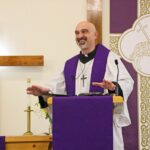We always thank God, the Father of our Lord Jesus Christ, when we pray for you, since we heard of your faith in Christ Jesus and of the love that you have for all the saints, because of the hope laid up for you in heaven. Of this you have heard before in the word of the truth, the gospel, which has come to you, as indeed in the whole world it is bearing fruit and growing—as it also does among you, since the day you heard it and understood the grace of God in truth, just as you learned it from Epaphras our beloved fellow servant. He is a faithful minister of Christ on your behalf and has made known to us your love in the Spirit.
And so, from the day we heard, we have not ceased to pray for you, asking that you may be filled with the knowledge of his will in all spiritual wisdom and understanding, so as to walk in a manner worthy of the Lord, fully pleasing to him, bearing fruit in every good work and increasing in the knowledge of God.
May you be strengthened with all power, according to his glorious might, for all endurance and patience with joy, giving thanks to the Father, who has qualified you to share in the inheritance of the saints in light. He has delivered us from the domain of darkness and transferred us to the kingdom of his beloved Son, in whom we have redemption, the forgiveness of sins.
– Colossians 1:3-14
The Colossian congregation had a colossal problem: Teachings that seemed different than the message they had first received about Jesus, yet had many similarities with what they had first learned about Jesus, were starting to crop up within the congregation.
We don’t know precisely what those teachings were, but we can deduce from what Paul wrote that they “Colossian heresy[1]” was a form of Gnosticism. Gnosticism can be difficult to nail down and it comes in many different varieties, but the main idea always has to do with a secret knowledge (Gnosticism gets its name from the Greek word for knowledge).
The Colossians had heard and received the gospel of Jesus Christ, it seems, from missionary Pastor Epaphras. But then, it seems, other teachers…false teachers…came around. They too spoke of Jesus. They too claimed to be representing the gospel of Jesus Christ. But their message was not the true Christian gospel message.
The areas of the Gnostic heresy seem to have touched on many things, including diet, worship of angels, the day of worship, and mysterious knowledge. But at its core the problem with the Gnostic heresy was that it undermined the true Gospel of Jesus Christ; it robbed Jesus of His glory and Christians of the comfort that we can have in Christ.
But the problem for the Colossian congregation wasn’t just the Gnostic heresy, but the fact that the book of Colossians that we have in our Bible, didn’t yet exist!
We are indebted to the Colossian congregation though, because they cared so much about right teaching and right practice that instead of allowing false teaching to fester, they took action. At considerable expense to the congregation, no doubt, they sent their beloved Pastor Epaphras, from whom they had first heard the gospel, to go to Paul and ask him how to answer the questions that had been raised.
Traveling in those days was dangerous and costly. But Epaphras and the Colossian congregation considered the God’s truth to be well worth the risk and the cost.
Epaphras found Paul in Rome, where he was imprisoned. The imprisoned Paul rejoiced to hear what the Holy Spirit was doing at Colossae and fulfilling his calling as an Apostle of Jesus Christ, Paul went to work, confirming the Colossian congregation in the gospel.
Paul writes,
May you be strengthened with all power, according to his glorious might, for all endurance and patience with joy, giving thanks to the Father, who has qualified you to share in the inheritance of the saints in light. He has delivered us from the domain of darkness and transferred us to the kingdom of his beloved Son, in whom we have redemption, the forgiveness of sins. (Colossians 1:11-14)
Note how Paul speaks of the past, present, and future.
May you be strengthened in all power is present tense. May you be strengthened right now!
Giving thanks to the Father, who has qualified you to share in the inheritance of the saints in light speaks of a future inheritance that belonged to the believers right then and there!
He has delivered us from the domain of darkness and transferred us to the kingdom of his beloved Son is past tense. It’s already happened! It is finished!
Paul writes to the Colossians, and by extension to all believers in Christ, to say that right now, present tense, you have an inheritance the belongs to you because you have already, through baptism into Christ, been transferred to the kingdom of Jesus Christ! Salvation belongs to you right now because of Jesus!
Don’t let anyone rob you of the certainty God has given you in Jesus!
Prayer
Lord Jesus, we thank you for faithful ministers of the gospel like Epaphras, who faithfully taught the gospel and pointed people to Your completed work of salvation. Help us to be faithful in teaching the gospel. Give us the confidence that because of Jesus and His saving work, because we have been baptized into Christ, that we have been transferred from the domain of darkness to Your eternal kingdom. In Your precious name we pray. Amen.
Questions for conversation
- What difference does it make if Jesus has done nearly everything for our salvation vs. Jesus having done everything for our salvation?
- How can it be tempting to believe that we need to move beyond the truths you learned in confirmation class from the Small Catechism?
- Why is it important that Paul speaks of deliverance in the past tense?
[1] Deterding, Paul E., Colossians. Concordia Commentary. St. Louis: Concordia, 2003







0 Comments